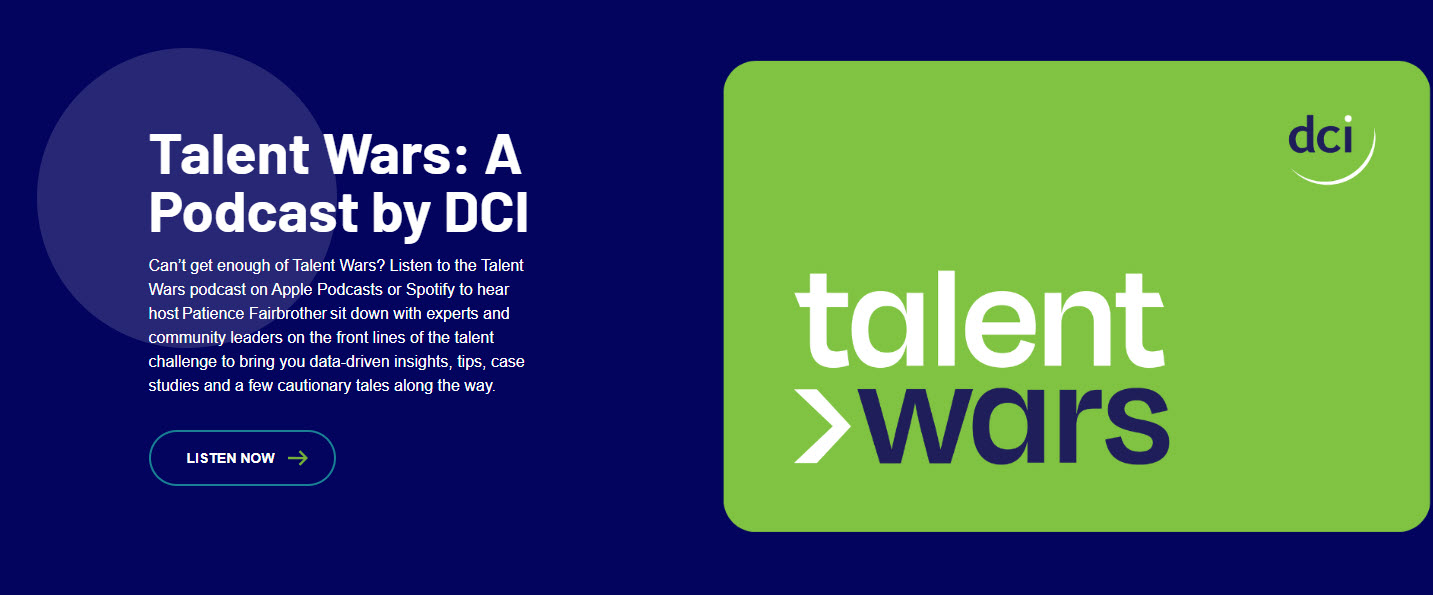MythBusters: Talent Wars Edition
MythBusters: Talent Wars Edition

As the demand for skilled workers surges, communities everywhere are in a high-stakes race to become places that top talent wants to call home.
But what really drives relocation decisions today? The “Talent Wars 2024” report from the Development Counsellors International (DCI) is here to clear up the confusion, busting up common myths and providing fresh insights on what influences where skilled workers choose to live.
From job-driven moves to the appeal of small metro areas, here’s the real story on what attracts talent – and how communities and companies can use these insights to position themselves strategically in the talent attraction game.
Here are the key takeaways and motivations for workers relocating:
- Myth: Talent’s priorities change every year. Myth Busted: Talent priorities have remained consistent over time. Cost of living, housing, and safety are consistently top factors for relocation decisions, underscoring a steady focus on practical concerns.
- Myth: People move to a place first and find a job later. Myth Busted: People are not relocating first, and then finding a job. Seventy-six percent of those surveyed either had a job prior to relocating, or were working remotely before the relocation. While livability factors do influence relocation, the majority won’t move without a job lined up.
- Myth: Gen Z has different priorities than other generations. Myth Busted: Gen Z’s priorities largely fall in line with those of Gen X and Millennials, though slight differences exist. Gen Z generally relocates for a better quality of life, while Gen X focuses more on being closer to family. Overall, cost of living, job opportunities, and housing are significant across the board.
- Myth: “White-collar” and “blue-collar” talent have different priorities. Myth Busted: Both white-collar and blue-collar talent have similar motivations when relocating, with quality of life, family, and job security driving relocation. White-collar workers, however, do put more emphasis on safety and crime rates, while blue-collar workers prioritize affordable housing and meaningful work.
- Myth: Crime rates are preventing places from attracting talent. Myth Busted: Perceptions of safety are crucial, but they can be positively influenced by strategic public relations and community ambassador programs that emphasize a sense of security and stability.
- Myth: Talent wants the flexibility of remote work. Myth Busted: Many workers are showing a renewed interest in hybrid arrangements or a return to office work. Although remote work remains attractive, convenience, social aspects, and amenities – as long as they match the conveniences of home – are reeling workers back to in-person and hybrid settings.
- Myth: Talent wants to move to major cities. Myth Busted: While large cities certainly have appeal, talent is showing interest across diverse community types, with a preference toward suburban, rural, and smaller metro areas. This suggests a strong opportunity for regional marketing.
- Myth: Those who are not currently in the workforce are uninterested in working. Myth Busted: Many non-working individuals are open to re-entering the workforce with the right incentives, such as competitive salaries, paid training, or meaningful work, especially if access to childcare is available.
Some Insight from DCI’s VP of Talent Attraction
Safety Perceptions are a Major Barrier to Talent Attraction

DCI Vice President
One of the most challenging issues that communities have to tackle, according to DCI, is the impact of safety perceptions. “Safety continues to be a top factor that talent evaluates as part of relocation decisions,” said Patience Fairbrother, DCI’s vice president of talent attraction. However, many communities struggle with negative perceptions fueled by sensationalist media coverage or internal negativity. “Regardless of actual crime statistics, many communities are plagued with ‘if it bleeds, it leads’ news coverage and internal negativity that contribute to worse perceptions of safety than are a reality,” she noted.
The solution? DCI recommends a proactive media relations strategy that includes partnerships with local media, owning the narrative on safety with SEO-driven content to influence search results, and a network of local ambassadors to share positive, authentic narratives.
“To any community struggling with negative perceptions, know that you are not alone,” Fairbrother said. “Be authentic and transparent and provide useful proof points and tools. Talent is going to seek out this information either way and with a smart communications strategy, you can be the architect of your own story.”
Digital Presence is the “Front Door” for Talent
We’re in an age of digital-first relocation, and a community’s online presence plays a crucial role. DCI stresses the importance of a mobile-friendly website: “The number one mistake we see in digital marketing for talent attraction is failing to prioritize the mobile experience. The large majority of people looking for information about places to live and work are doing so on their phones,” Fairbrother said.
DCI also recommends focusing on a few key social platforms – like Facebook, Instagram, and LinkedIn – rather than spreading resources too thin, which can lead to inconsistent posting on platforms like YouTube and TikTok.
As online resources become increasingly influential in relocation decisions, community forums like Reddit and Nextdoor are playing a role – though perhaps not as pivotal as some might expect. According to DCI, while forums provide insight into community life, they don't rank among the top platforms for learning about jobs or places to live. Rather than investing heavily in these forums, DCI recommends a grassroots approach: building a network of local ambassadors who can authentically share their experiences.
“This grassroots strategy can be highly impactful – word of mouth from friends, family and colleagues ranks No. 3 among the top sources influencing perceptions of places to relocate, just behind internet research and first-hand experience,” Fairbrother said.
Rethink Hybrid Work and Regional Marketing
With hybrid work becoming more popular, DCI’s report notes a shift in preferences for suburban, rural, and small metro areas over large urban centers. Rural communities can leverage this trend by collaborating regionally. “Our data consistently finds that cost of living is the top factor talent prioritizes – and not everyone dreams of moving to a big city,” Fairbrother said.
While cost of living remains a top priority, the choice of community type is shifting: suburban areas lead with 41% preference, followed by rural (30%) and small metros (16%), with large metros last at 13%. The cost advantage of non-urban areas offers a competitive edge for regions looking to attract talent who seek affordability and hybrid work options.
“We are big believers in regional marketing because the more types of assets you have to offer (urban, suburban, rural), the wider your potential pool of talent. If rural communities can work together with their broader region to tell the story of the jobs and amenities available within reach, they will be more successful than going it alone,” said Fairbrother.
Looking Ahead: The Future of Talent Attraction
As migration continues away from major urban centers, midsized and smaller communities are positioned to benefit – especially those offering affordability and hybrid-friendly work environments. DCI anticipates that relocation will remain a digital-first journey, so investing in an engaging online presence and collaborating regionally will be key to future success.
According to DCI, the talent landscape is competitive, and communities need to stay on the same page when it comes to regional marketing. By addressing common misconceptions, focusing on safety narratives, and harnessing digital tools, communities can boost their appeal to today’s skilled professionals.
“Our hope is that we will see more examples of regionalism and collaboration across economic development and tourism to solve these challenges,” Fairbrother said. “We believe in the power of ‘singing from the same song sheet’ when it comes to marketing your region – and with more and more competition in the marketplace, communities need to work together to stand out to talent.”
For more insights from DCI’s research, download the free report, Talent Wars 2024, aboutdci.com/research/talent-wars-2024

